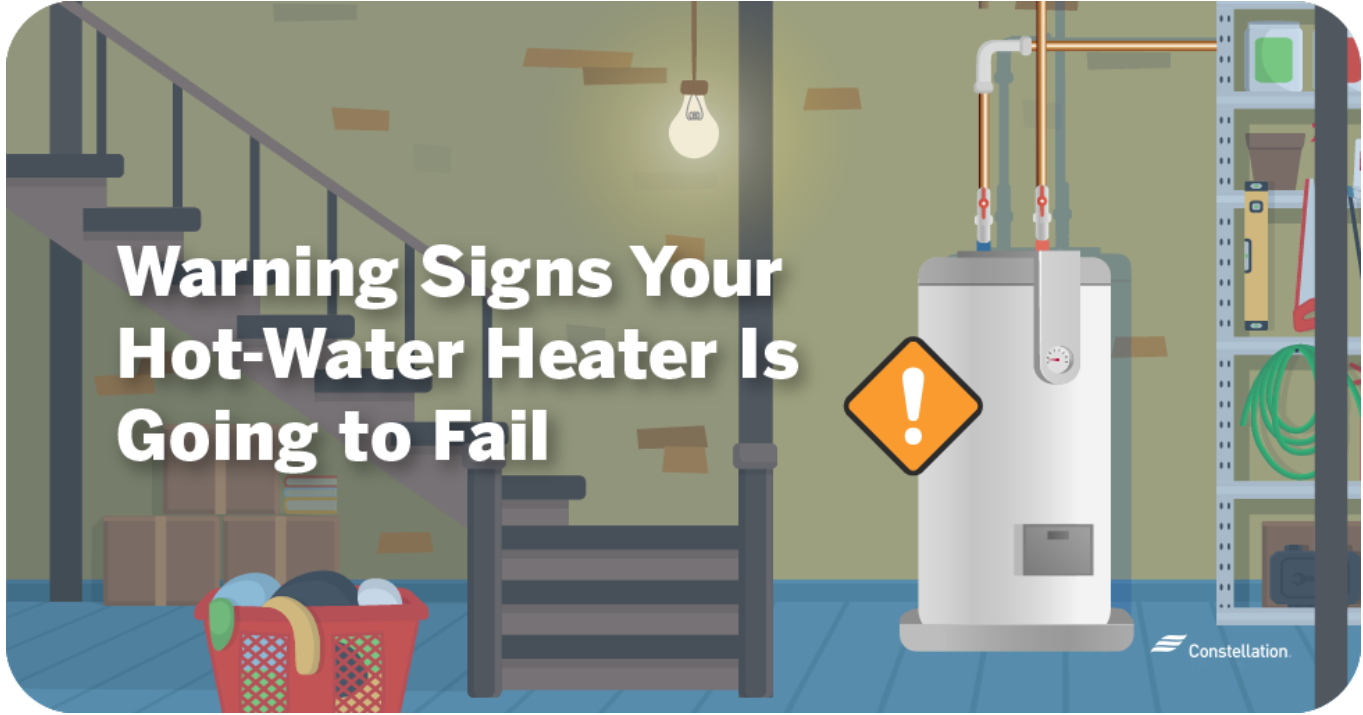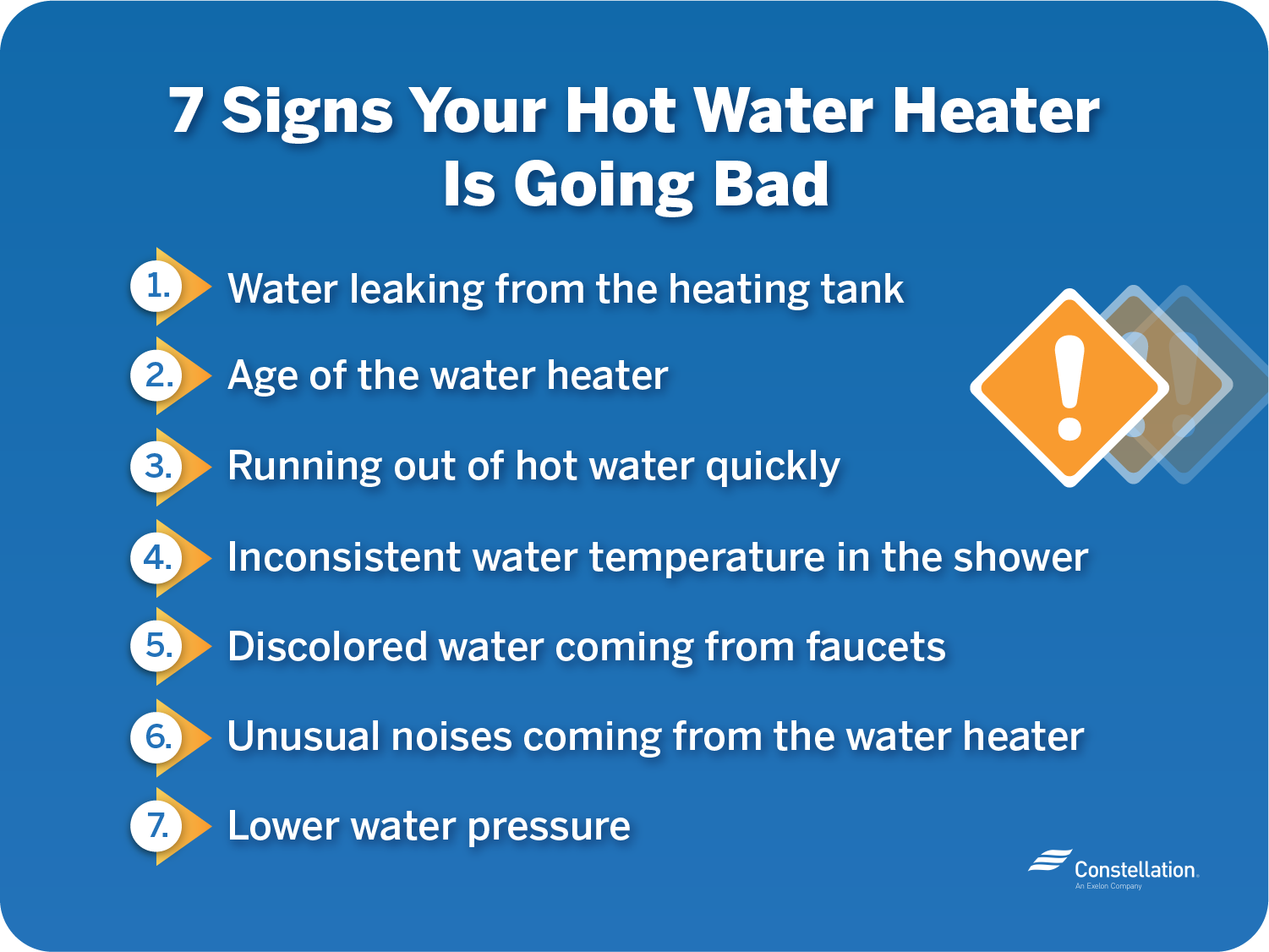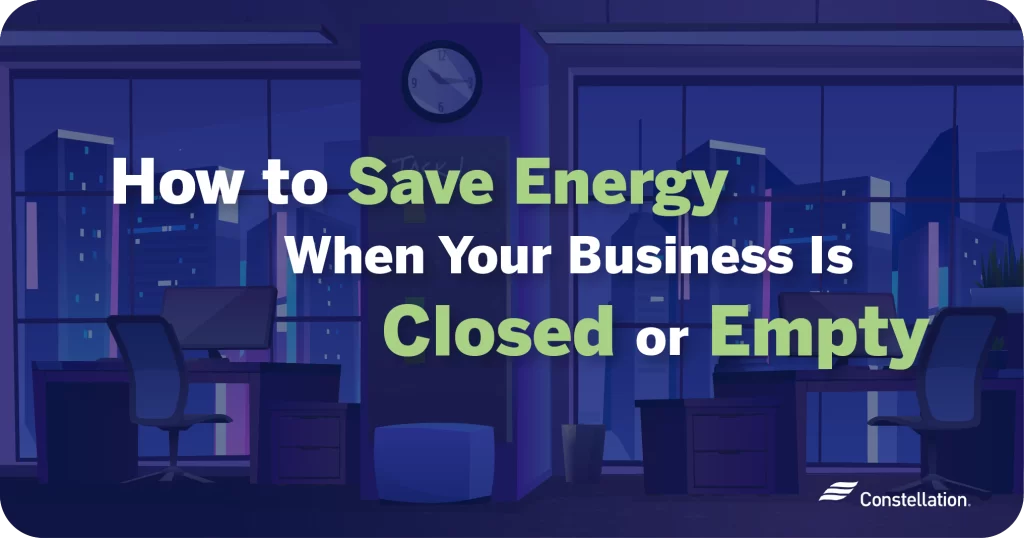
- Category:
Home Energy Savings -
Last updated:
November 16, 2023
7 Signs Your Hot Water Heater Is Going to Fail
Hot water is easy to take for granted — until suddenly you don’t have it. Luckily, hot water heaters rarely stop working without warning. That’s why it’s so important not to ignore the signs your hot water heater is going out. You can avoid being uncomfortable, suffering damage from a leak or the cost of an unexpected breakdown if you learn how to spot the signs that your hot water heater is going to fail.
What Causes a Hot Water Heater to Go Bad?
Before diving into the warning signs that your hot water heater is giving out, it helps to understand the parts inside your unit. A traditional water heater has a water storage tank that’s surrounded by protective linings. In the center is a pipe enclosing the burners to heat the water. They can be configured differently, depending whether they’re electric or gas powered. An anode rod attracts corrosive particles to lengthen the life of the unit.
Hot water heaters typically last between 10 and 15 years. Several factors contribute to what causes a hot water heater to go out. Anode rods get used up over time. Metal tanks can corrode or leak. Heating elements break or stop working. Sometimes you can replace a part. But if your hot water heater keeps going out, you might be better off replacing the whole unit, especially if your current unit has been in service for 10 years or more.
Signs Your Hot Water Heater Is Going to Fail
Learning how you tell if your hot water heater is going out can save you money and hassle. “But how do I know if my water heater is breaking?” you may be asking yourself. By heeding the following common signs your hot water heater will breakdown soon, you may be able to avoid the worst.

1. Water leaking from the heating tank
Leaks are a sign your hot water heater is failing. You might see water dripping from the tank or pooling under the unit. Or you may see pipes that drip water.
It’s possible the valves are not fully closed or that connections are loose. These components may need tightening or replacing, which are easy fixes. If the tank is leaking, though, you have no choice but to replace your water heater.
2. Age of the water heater
If your unit is old, be vigilant. Most companies apply a label with an installation date on it. If that’s missing, you can take the brand name and unit serial number and go online to find the date of manufacture.
Getting a new hot water heater may help save you money. ENERGY STAR ® units are extremely efficient, heating water faster with less energy. Another advantage is that newer units can take up less space.
3. Running out of hot water quickly
If you haven’t flushed your hot water heater regularly or have a high volume of sediment in your water, those particles could settle in the tank. Accumulated sediment leaves less space for hot water, which is why you run out of it fast. It’s a clear symptom of your hot water heater going bad.
If the situation goes unfixed for too long, it may no longer be possible to flush the sediment out of the unit, and you may end up with clogged and corroded valves. Then you would have to replace the unit. And if so, you might want to consider a tankless versus a traditional water heater.
4. Inconsistent water temperature in the shower
Another clear sign that your hot water heater is going out is that your water temperature is inconsistent. If you’re lucky, you might just have a problem with the thermostat, which can be replaced. If heating elements are broken, you have a bigger issue.
Again, consider the age of your unit. It might be cheaper to replace it and enjoy the cost savings you get from a new energy-efficient water heater.
5. Discolored water coming from faucets
Murky or rusty water is another of the common signs your hot water heater is failing. Water heater tanks have a coating that slows corrosion, but it doesn’t last forever. Once the coating begins to thin, rust forms fast.
Rusty water is one way to know if your hot water tank is going bad. It won’t necessarily harm your health, but it can discolor appliances and damage their parts. And it definitely won’t taste good. If the problem is mild, replacing the anode rods can extend the life of your unit. Consider flushing it, as well.
6. Unusual noises coming from the water heater
If your hot water heater is making strange sounds, it could be a sign your water heater element is breaking. That’s bad news, but it could mean any number of other things, too. Sediment and mineral deposits could be clogging your system. You might have poor water flow or changing water pressure in your home. Or valves and connections might be loose.
Hire a professional to flush your system and give it a checkup. They’ll let you know if the noises were hot water heater signs of failing or just a reminder to get it serviced.
7. Lower water pressure
If your home has low water pressure, sediment builds up faster. The difference between hard and soft water is also a factor, as hard water will clog systems faster than soft. If you experience low water pressure from your taps, you may have significant buildup in your hot water heater and connections.
Again, it’s one of the signs your hot water heater is going out, but it can also be a sign you need service. If you take care of it early, you may be able to extend the life of your unit.
Dealing with water heater failure
The signs your hot water heater is going out should not be ignored. If you experience even one of them, be vigilant, get your system professionally serviced and start budgeting and shopping for a replacement. And if you do need to buy a new water heater, consider an upgrade on efficiency. Units certified by ENERGY STAR ® and other energy-efficient appliances can help you conserve power and lower your energy bills.




